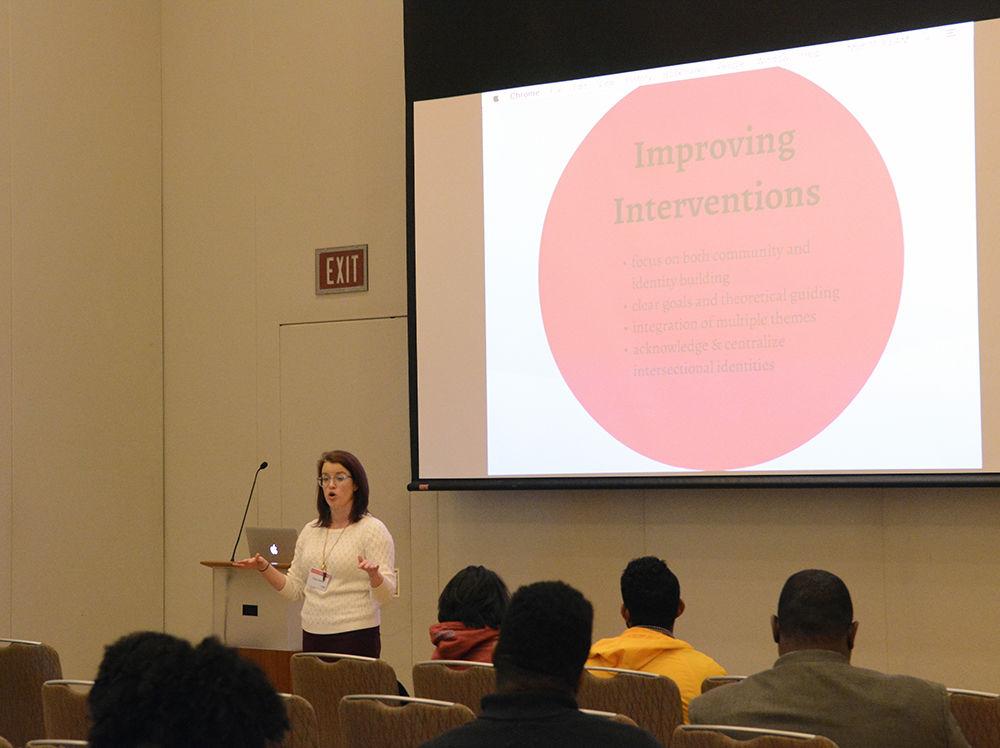 Teaching assistant professor Patsy Sibley offers different ways of how we can intervene to prevent issues against women in STEM during the Diversity in STEM Symposium on Monday in Talley Student Union. Sibley works in interdisciplinary studies and has conducted research in feminist science studies in an effort to find ways that we can improve the equality of gender in STEM." />
Teaching assistant professor Patsy Sibley offers different ways of how we can intervene to prevent issues against women in STEM during the Diversity in STEM Symposium on Monday in Talley Student Union. Sibley works in interdisciplinary studies and has conducted research in feminist science studies in an effort to find ways that we can improve the equality of gender in STEM." />
Cody Helm
Teaching assistant professor Patsy Sibley offers different ways of how we can intervene to prevent issues against women in STEM during the Diversity in STEM Symposium on Monday in Talley Student Union. Sibley works in interdisciplinary studies and has conducted research in feminist science studies in an effort to find ways that we can improve the equality of gender in STEM.
The College of Sciences held its first Diversity in STEM Symposium: Making Space for Ourselves and Others, exemplifying minority research and accomplishments within science, technology, engineering and math fields. The event took place in Talley Student Union Monday, and was sponsored by Baden Aniline and Soda Factory (BASF), one of the world’s largest chemical companies.
The symposium is part of an ongoing initiative to increase and celebrate all kinds of diversity in STEM at NC State. Tammy Nunn-Haynie, the diversity programs consultant for BASF, summed up the purpose of the symposium in her welcome presentation.
“If we all walk the same, talk the same and want to work for BASF, BASF would be out of business,” Haynie said.
Jamila Simpson, assistant dean for academic programs, student diversity and engagement for the College of Sciences, coordinated the symposium in hopes of reaching a range of diverse groups including race, sexual orientation, socioeconomic status and ability.
“The statistics show that there are populations that are underrepresented in the STEM fields,” Simpson said. “It is important to do things like bring back alumni [to provide role models for minority students].”
The symposium allowed students, faculty and staff to participate in a session that educated them on diversity in STEM and explored student research.
Simpson was the first African-American female to graduate with a bachelor’s degree in meteorology from NC State and said she has experienced the difficulties of entering a field of people unlike herself.
“We can’t underestimate how important it is to see reflections of yourself,” Simpson said. “I’ve had little kids and adults close their eyes and imagine a scientist doing science, and they usually imagine an older white male with crazy hair. They don’t imagine themselves. If people can’t see themselves in these roles, it creates a barrier.”
Zach Mundy, a member of the Ph.D. Leadership Development Program at BASF, discussed the importance of a workplace that values diversity.
“If everyone had the same thought, you’re not really making progress or building on each other,” Mundy said. “[BASF] has employee resource groups that facilitate interactions in our inclusive environment.”
Mundy provided words of encouragement for students subjected to feeling alone in STEM and marked the importance of reaching out to other people.
“Don’t be afraid to be vulnerable so people can support you,” Mundy said. “[In graduate school] we were all burned out and afraid to admit it, but once someone brought it up, others related and were relieved they weren’t alone.”
Kristen Roskov, a sales representative from BASF, said she wrestled with being a woman in engineering throughout both her undergraduate and graduate careers but learned ways to cope over time.
“I totally felt the imposter syndrome as a woman in engineering,” Roskov said. “Don’t miss out on ways to get involved with groups to connect with like-minded people.”
Aitana Blevins, a first-year studying paper science and engineering, recognizes how diversity in STEM faces barriers rooted deeply in history.
“Instilled years of lack in diversity [contribute to ongoing barriers], so it’s going to be really hard to break barriers without more time,” Blevins said.
BASF will also sponsor an on-campus movie series relating to diversity in STEM. The event will include popular movies, such as “Hidden Figures,” that exemplify field diversity. The movie series will be introduced this spring.